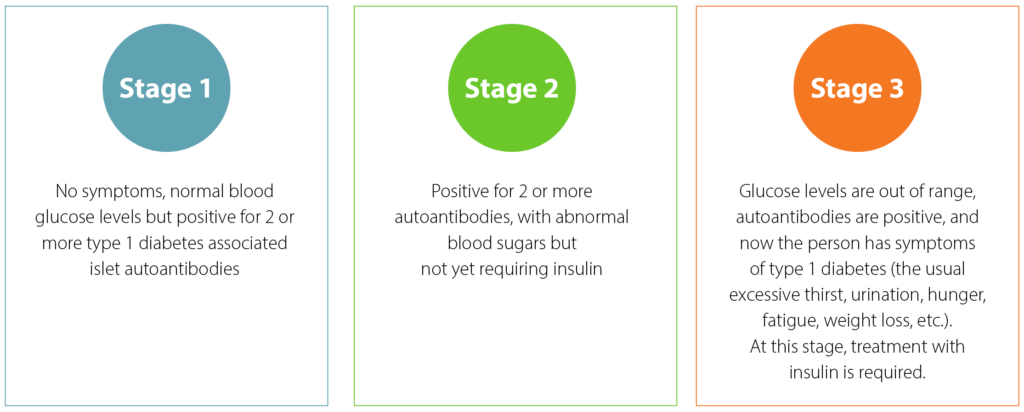Diabetes basics pertinent to screening
We know that type 1 diabetes is an autoimmune condition, meaning that the body’s immune system starts attacking its own body. The immune system is supposed to help the body fight off things such as viruses, flus, colds, etc. But sometimes it goes rogue and we don’t fully understand why yet. What we do know is that the autoimmune process is not an instantaneous event, but a slow progressive process.
What this means is that we’ve figured out type 1 diabetes has three stages:1


What are autoantibodies?
Autoantibodies are proteins in the blood that tells us the body’s immune system is attacking itself. There are many different ones related to other conditions. For type 1 diabetes, we are looking for islet autoantibodies, which indicate the body is starting to attack its islet cells. (Islet cells are where insulin is made in the pancreas.) For more detailed information on the various autoantibodies that can be screened for diabetes, this is a good resource.
How to get screened:
Before we can delay onset, we have to identify people who are at risk for developing type 1 diabetes. One of the biggest challenges is identifying people before they get to stage 3 or full-on diabetes. There are many groups helping get the information out there such as JDRF and the T1D Exchange, and a new website designed by the makers of Tzield called Screen for Type 1.
Here are the ways to get screened as of 2023:2
| Trial Net | Free | Blood draw or Fingerstick Options | First Degree relative with T1D ages 2.5-45 | TrialNet.org |
| ASK (Autoimmunity Screening for Kids) | Free | Blood draw | Kids 1-17 in the U.S. | askhealth.org |
| Enable Biosciences | $89+ | Fingerstick | No restrictions | type1testing.enablebiosciences.com |
| Your Doctor and Local Lab | Varies by insurance and antibodies | Blood draw | No restrictions | Insulin Antibody: CPT 86337 Anti-Islet Cell Antibody: CPT 86341 GAD Autoantibodies: CPT 86341 IA2 Autoantibodies: CPT 86341 Zinc-Transporter 8 Autoantibody: CPT 86341 |
It should be noted that diabetes is different for everyone, and each method of testing has its own risk for inaccuracies. Now that more people are getting screened, some are noticing screening negative for antibodies on one test method and positive on others. Additionally, there is known variability related to age and ethnicity.3,4
What treatments are currently available to delay onset?
In November 2022, the first medication that has been proven to delay the onset of type 1 diabetes was approved in the United States by the FDA (Food & Drug Administration). The medication is called Tzield or teplizumab and is used when Stage 2 diabetes is detected. In the studies, Tzield delayed the onset of stage three diabetes by an average of two years. The medication is taken through an intravenous (IV) infusion daily for 14 days. It takes around 30 minutes to complete the infusion each day, and you can expect additional waiting time depending on where you are able to get it done. The most common side effects from Tzield from the studies were rash, headache and low white blood cell count. Most often, these resolved quickly, and it was not so severe that people stopped completing the infusions.
Why delaying onset matters
Most people are diagnosed with diabetes after having all the classic symptoms of drinking way more than usual, urinating more than usual, losing weight, and all too often come into the hospital with DKA. The more that we can prevent people from having terrifying, life-threatening starts to this condition, the better.
Although there is still data collection ongoing to measure the effects of delaying the onset of diabetes, as anyone with diabetes or caring for diabetes would tell you, any amount of time without diabetes is better than any amount of time with diabetes.
Resources:
- Staging Presymptomatic Type 1 Diabetes: A Scientific Statement of JDRF, the Endocrine Society, and the American Diabetes Association
- JDRF: T1Detect: Learn About Type 1 Diabetes Risk Screening
- Relationship between islet autoantibody status and the clinical characteristics of children and adults with incident type 1 diabetes in a UK cohort
- Ethnic Differences in Progression of Islet Autoimmunity and Type 1 Diabetes Mellitus in Relatives at Risk
Written and clinically reviewed by Marissa Town, RN, BSN, CDCES



